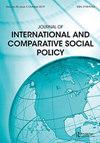Social policies in democratic and authoritarian regimes: comparing the introduction and implementation of the National Rural Employment Guarantee in India and Dibao in China
Q2 Social Sciences
Journal of International and Comparative Social Policy
Pub Date : 2022-11-01
DOI:10.1017/ics.2022.16
引用次数: 1
Abstract
Abstract Research on the welfare state often examines social policies in democratic regimes separately from social policies in authoritarian regimes. Two bodies of research have emerged, as the extant literature views these political systems as sufficiently distinct to merit the division of analysis. In this article, we challenge the existing approach by showing that differing regime types can indeed be analysed together. By looking for patterns of similarities, rather than differences, we bring the two literatures into conversation and show how a common factor can trigger social policy expansion in both regime types. Using case studies of India and China, the two most populous democratic and authoritarian regimes, this article illustrates how the expansion of policies that serve low-income groups – India’s Mahatma Gandhi National Rural Employment Guarantee (NREGA) and China’s Minimum Livelihood Guarantee Scheme (dibao) – were both prompted by social mobilisation.民主和专制政权下的社会政策:比较印度和中国的国家农村就业保障制度的出台和实施
摘要对福利国家的研究经常将民主政体中的社会政策与威权政体中的政治政策分开来考察。出现了两个研究机构,因为现存的文献认为这些政治制度足够独特,值得进行分析。在这篇文章中,我们对现有的方法提出了挑战,表明不同的制度类型确实可以一起分析。通过寻找相似而非差异的模式,我们将这两篇文献纳入对话,并展示了一个共同因素如何在两种制度类型中引发社会政策扩张。本文通过对印度和中国这两个人口最多的民主和独裁政权的案例研究,说明了为低收入群体服务的政策——印度圣雄甘地国家农村就业保障(NREGA)和中国的最低生活保障计划(dibao)——的扩大是如何由社会动员推动的。
本文章由计算机程序翻译,如有差异,请以英文原文为准。
求助全文
约1分钟内获得全文
求助全文
来源期刊

Journal of International and Comparative Social Policy
Social Sciences-Sociology and Political Science
CiteScore
3.70
自引率
0.00%
发文量
18
 求助内容:
求助内容: 应助结果提醒方式:
应助结果提醒方式:


